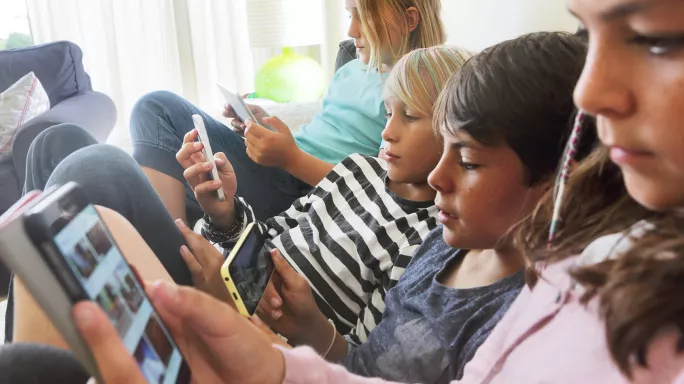We often talk about children’s unhealthy behaviour in the digital world: cyberbullying, sexting, gaming, gambling and so on.
We talk to parents about the difficulties of digital parenting, yet we rarely look at adult behaviour in the digital world or consider how it affects the habits that children form.
As “digital immigrants”, we have a different relationship with the online world to that of our children, the digital natives.
Quick read: The best tech in the classroom? An old-school whiteboard
Quick listen: The truth about screen time, tech and young people
Want to know more? How can AI improve your college?
They were born in the digital age, where boundaries between the online and the real are fading away.
Mobile internet use now exceeds desktop use, and we can be surrounded by technology 24/7.
For most adults, however, it is still easy to distinguish between the two worlds quite clearly, as we know what it used to be like before the digital takeover happened.
After all, it was only in 1991 that the web became publicly available. It wasn’t until 2004 that Facebook was founded, followed by YouTube in 2005, Twitter in 2006 and Instagram in 2010. The first iPhone was released in 2007, and the first wi-fi-enabled iPad came in 2010.
But there’s no denying that these fairly recent developments have had a profound effect on our lives, especially in terms of speed.
The speed of communication and decision-making, the speed of sharing news, the speed of apps appearing, reaching their peak and vanishing into thin air.
That pace is the norm for children now, while many adults are still adapting to that lifestyle, forming healthy or unhealthy habits in the process.
Question time
So, taking all this into account, the question is: are we being good role models for our children? Every family is unique, everybody’s circumstances are unique, and we are dealing with the real and digital lives in our unique way.
After speaking to many children and adults while conducting research in this area, I have found some key questions useful in gaining a greater self-awareness of your relationship with tech:
- Do you text or call your child when both of you are at home?
- Do you use two devices at once (iPad and phone, phone and TV, laptop and phone, and so on)?
- Do you use your phone as your alarm clock?
- Do you have your phone with you at meal times?
- Are you aware of how much time you spend on social media?
- Do you check your phone during family time/outings?
- Do you have technology-free time?
It is important that, as adults, we are honest with ourselves about our own digital habits.
Digital parenting is not just about setting controls, switching off the wi-fi, talking about the importance of real-life communication and then going on our own devices thinking that our job is done.
Digital parenting is also about modelling and showing what healthy really looks like in practice.
Maria O’Neill is an advanced Skills Teacher, eSafety co-ordinator and Head of PSHE. Wellbeing coach, PhD student researching wellbeing and personal development, founder of @HealthyToolkit and @UKPastoralChat



